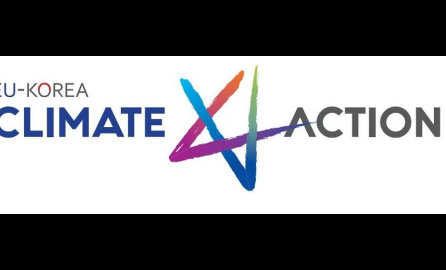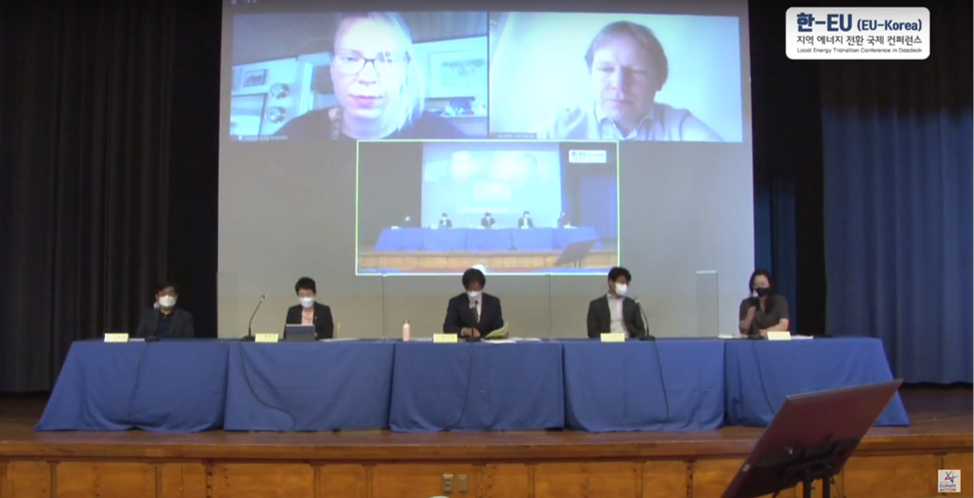Event 1. EU-Korea Local Energy Transition Conference in Daedeok
On 1 June 2021, the EU-Korea Climate Action Project in cooperation with the local government of Daedeok District in Korea, and Dajeon Energy Transition Network organized the ‘EU-Korea Local Energy Transition Conference in Daedeok’ to support Korean local governments in developing policy measures to achieve energy transition from fossil fuels to renewable energy by sharing energy transition cases of selected local governments in the EU and Korea.
Kerkko Vanhanen, Programme Director at Forum Virium Helsinki presented the case of the Kalasatama District in Helsinki as a smart city lab of Finland. Kerkko explained that under the vision of ´Creating one more hour a day by making people’s life easier,´ Kalasatama created the Forum Virium Helsinki which is an innovation company owned by the City of Helsinki. Forum Virium is initiating smart experiments in the area of smart energy, mobility, smart everyday services, robotics and digital twin, together with various stakeholders such as corporations, startups and SMEs, City, and research institutions.
Louise Lyng Bojesen, Director at the Center for Nature, Environment and Leisure of the Bornholm Regional Municipality in Denmark discussed the important aspect of citizen participation in developing the energy transition policy and deploying climate actions in the city. Bornholm implemented a variety of activities to engage citizens in the process, ranged from simple activities such as encouraging citizens to reveal their targeted sustainable actions on social media to more complicated ones including the organization of energy fairs. Louise emphasized that there are no quick fixes and policy makers have to prepare for many years ahead in order to actively involve people in developing city’s energy vision and strategies.
After the presentations of the EU cases, 4 Korean speakers delivered their presentations. The first presentation by Jeong-hyeon Park, District Mayor at Daedeok District Government was focused on the energy transition in the destrict. She explained that under the goal of reducing 50% of GHG emissions by 2030, the Daedeok District established a vision to create a Smart Green City by 2050. To achieve the goal, the District is planning to invest a total of KRW 540.6 billion in 40 energy transition projects. Examples projects include the Building Energy Café to foster activists and provide education on energy transition, Carbon Dieters, RE100 Campaign, small-scale PV supply projects and a Carbon Budget System.
The second Korean speaker, Young-un Ban, Professor at the Department of Urban Planning and Engineering at Chungbuk National University, informed about the concept of eco-industrial parks (EIPs), the status of industrial parks in Korea, the support provided by government to promote EIPs, and lessons learned from the experience. He said that there are around 1,000 industrial parks in Korea and showcased successful EIP cases such as the development of the Steam Highway in Ulsan which is exchanging surplus steam between facilities. He said the EIP will evolve into a Smart Eco-industrial Parks in the near future, where Industrial Symbiosis Networks will be matched utilizing big data and AI technologies.
Afterwards, Eun-young Park, the Secretary General at Daejeon Chungnam Green Korea United, delivered a presentation about the governance mechanism for local energy transition. She shared her experience of promoting energy independence and important lessons learned from it including: ensuring high decision-making power of administrators; direct participation by the residents; ensuring coordination is in place. She recommended local governments to identify and connect local resources, plan and implement the actions for carbon neutrality based on a cycle of planning, delivery, and evaluation.
Lastly, Young-ju Ko, President at the Daejeon Institute of Science & Technology for Enterprise & People presented Korea’s Energy Policy and key technologies for the local energy transition. In order to maximize the effects of technology applied for energy transition, he said that it is important to identify the ideas for energy transition, link them with science and technology, and transform the ideas into sustainable systems through living labs, social ventures and cooperatives. He proposed an approach where youth and citizens take the lead role in collaboration with experts who can identify the technologies to meet their demands. This approach will enable young people and citizens to design their city’s future and choose the technologies and systems that they need.
Related documents
Smart Kalasatama - Kerkko Vanhanen
English (5.95 MB - PDF)Citizen participation in the energy transition and climate actions in Bornholm, Denmark- Louise Lyng Bojesen
English (1.62 MB - PDF)Energy transition and Green New Deal of Daedeok district - Jeonghyun Park
English (7.5 MB - PDF)Korean EIP development initiatives-Yong Un Ban
English (4.64 MB - PDF)Technology for local energy transition - Youngjoo Ko
English (1014.35 KB - PDF)Daedeok Energy Transition Conference Program
English (478.6 KB - PDF)
